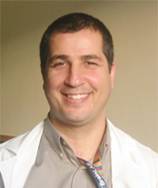
Many times in the course of the year, Hadassah saves the lives of people whose conditions were so serious it didn’t appear they would survive. While this does not happen every day, it is not a rare occurrence either. Often it is the skill and experience of our superbly trained medical staff that make the difference. Often it is the sophisticated equipment we were fortunate to acquire that is instrumental. For one five-year-old girl, Hadassah’s new Pediatric Neurosurgery Unit and its talented head, Dr. Mony Benifla, made the difference.
The new unit was created especially to treat Jerusalem’s children for brain tumors, genetic central nervous system defects, the birth defect spina bifida that leaves some of the vertebrae in the spinal cord unfused, traumatic head injuries, epilepsy and hydrocephalus. This condition, also known as “water on the brain,” develops when there is an abnormal accumulation of spinal fluid in the brain, which in turn, produces pressure on the brain with serious ramifications.
Before Hadassah created the new unit, children with these critical and sometimes life threatening problems and injuries did not receive the best and most comprehensive treatment, at times placing their lives at risk.
Last April on the evening of Israel Independence Day, a caring father took his excited five-year-old daughter up a ladder to watch the fireworks from their roof – but she never got to see them. Instead, she was bought to Hadassah after both of them fell from the ladder. The father was relatively unhurt, but the five-year-old landed on her head. When she arrived in a coma, her chances seemed slim.
“As we know,” Dr. Benifla says, “children are not simply small adults”. They have different pathologies – like spina bifida and hydrocephalus, conditions not seen in adults. They have different types of tumors, which often are in different locations. Children present different images than adults because their anatomy is different.
“Children’s brains can recover more easily, which is a great advantage. However, with a child, every injury is serious,” he says.
Dr. Benifla immediately operated on the five-year-old, removing part of her skull to relieve the pressure on her brain. She then underwent several additional operations– the last one, to put her skull bones back in place.
In addition to his specialty in pediatric neurosurgery, Dr. Benifla is one of only two epileptic surgeons in Israel, training in both specialties at Toronto’s Hospital for Sick Children.
Epilepsy affects about .07 percent of the Israeli population, which doesn’t sound like a large number, but that translates into about 50,000 people. Epilepsy is caused by abnormal electrical discharges in the brain or part of the brain, which cause seizures – some fleeting, some partial and some completely disabling. Medications help about 70 percent of people with epilepsy; however that leaves about 30 percent who continue to suffer. This is where surgery can help.
Treating children with epilepsy is different from treating adults – and children have an advantage, Dr. Benifla explains. They still have a fontanel – the “soft spot” on a baby’s head. Using a special ultrasound system he places directly on the fontanel, Dr. Benifla looks for abnormal electrical activity. He monitors the seizures seeking their source – and determines its relationship to the functional areas of the brain to avoid permanent damage. The fontanel and the ultrasound allow him “to see into the skull,” he says.
Dr. Benifla is eagerly awaiting the imminent opening of Hadassah’s new Epilepsy Center – unique in Israel – which will provide comprehensive care and treatment for children and adults. Its wide range of services and its multidisciplinary team will treat all aspects of the condition – from initial diagnosis to the management of patients with drug resistant epilepsy – including surgery. Equally important, especially for young people, the Center’s support team it will address the psychological and social problems that accompany the condition, with special sensitivity to cultural issues.
He is also looking forward to the opening of the Sarah Wetsman Davidson Hospital Tower and working in the Pediatric Operating Room Suite of the Tower’s Surgical Center. Operating on children with epilepsy and the other neurosurgical conditions he deals with, will be enhanced by the increased room and efficient installation of the advanced equipment he uses.
Since opening of our dynamic Pediatric Neurosurgical Unit ten months ago, the patient load has increased significantly; 75 children from newborns to teens – including babies rushed directly from the delivery room to the Unit – have already been treated.
Because Hadassah and Dr. Benifla were there with timely and sophisticated treatment, a five-year-old girl is now in a rehabilitation center, beginning to manage independent living and attending kindergarten. Her future looks much brighter than the fireworks she never got to see.
